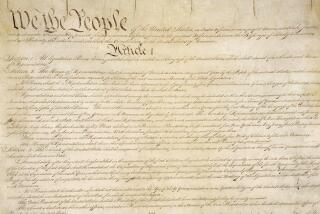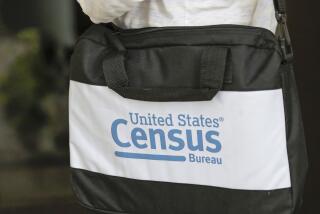Republicans answer census critics
- Share via
Reporting from Washington — According to many writers in the conservative blogosphere, the census taker is second only to the tax man as the preeminent symbol of government intrusion. Now several prominent Republicans, fearing the rhetoric could result in an undercount of their ranks, are trying to tamp down the census critics.
Former White House advisor Karl Rove recently made a public service announcement urging participation in the decennial head count. Rep. Patrick T. McHenry, the ranking Republican on the House committee that oversees the census, issued a statement criticizing claims that the survey is unconstitutional.
“What worries me is blatant misinformation coming from otherwise well-meaning conservatives,” said the North Carolina lawmaker, who pointed to early statistics showing conservative counties with participation rates that trailed the national average.
“Few things will make Nancy Pelosi happier than a low Republican census turnout,” said McHenry, referring to the Democratic House speaker.
“Conservatives need to know how important it is to fill out the census. . . . Boycotting will just help liberals expand government even further.”
McHenry’s comments highlight the stakes. The census count determines each state’s representation in Congress and the electoral college, and the drafting of state legislative districts. It’s also the basis for distributing billions of dollars in federal funding.
As such, it is more commonly a target for Democrats, who say the count misses large numbers of African Americans and Latinos -- groups that tend to fall into the party’s base. But today’s loudest critics have come from the right.
Rep. Michele Bachmann (R-Minn.) declared last year that she would only be filling out a portion of the 10-question form, claiming the rest might violate privacy rights. (She later supported a resolution urging Americans to fill out the form.)
On his website, Rep. Ron Paul (R-Texas) said he thought the census had “grown far beyond what the framers of our Constitution intended.”
Several websites popular with the small-government “tea party” movement offer long discussion threads on whether the Constitution instructs the government to ask only about the number of people in a household, and not more specific demographic information. Others suggest that the census information won’t remain confidential.
Most recently, critics have targeted the American Community Survey, a longer offshoot of the census that is distributed annually to a small portion of the population. The survey seeks more detailed information on income levels, marital history and employment. If not filled out, it can be followed with persistent calls and visits from a census worker.
Erick Erickson, a conservative blogger and CNN commentator, recently said that if a government worker tried to arrest him for not filling out the longer form, he would “pull out my wife’s shotgun, and see how that little ACS twerp likes being scared at the door.”
The penalty for not filling out the longer survey is the same as for not filling out the census, a fine of up to $5,000. No one has been prosecuted for noncompliance for several decades, according to Census Bureau Director Robert Groves.
On the bureau’s website and in speeches, Groves likes to remind people that the current census is one of the shortest in history and contains three of the same questions asked in the original form in 1790.
Although some census critics have been saying that only the first question -- which asks for the number of people in a household -- should be answered in order to comply with the constitutional requirement, there has not been an unusually high number of forms returned that way, Groves said.
“There’s no evidence that this is a movement,” he said.
kathleen.hennessey@ latimes.com
More to Read
Sign up for Essential California
The most important California stories and recommendations in your inbox every morning.
You may occasionally receive promotional content from the Los Angeles Times.











